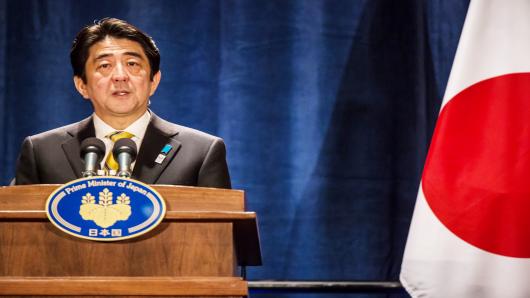Japanese Prime Minister Shinzo Abe hopes talks with Russian President Vladimir Putin on Monday will revive efforts to end a territorial dispute that has prevented the nations signing a treaty to end World War Two.
Japan also expects Russia to present a proposal for Japan's participation in building a pipeline connecting East Siberian gas fields and a planned $38 billion Vladivostok gas hub built by state-controlled Russian export monopoly Gazprom .
It is unclear whether Abe, whose talks with Putin will be the first full-fledged Russo-Japanese summit in Moscow in a decade, will leave with progress toward either of those goals, despite areas of interest that converge.
Japan is the largest importer of liquefied natural gas (LNG) and sees Russia as a strategic partner as it looks to diversify and cut the costs of LNG imports, which shot up after a 2011 disaster at its Fukushima nuclear plant.
(Read More: Under Xi, China Seeks to Cool Row With Japan Over Islands)
Russia is seeking to firm up its footing in Asia as it warily watches China's growth - despite warm ties with Beijing - and the U.S. "pivot" to the Pacific. Russia could use Japanese money and know-how to develop its sparsely populated far east.
But Russia's interest in increasing commerce with Japan will not necessarily lead to progress in the dispute over four small islands in the Pacific, known as the Southern Kuriles in Russia and the Northern Territories in Japan.
The islands were seized by the Soviet Union after it declared war on Japan in August 1945 and days before Japan surrendered, forcing about 17,000 Japanese to flee. They are near rich fishing grounds.
The dispute has prevented Russia and Japan from concluding a peace treaty and clouded ties ever since.
Senior Russian and Japanese officials have discussed the territorial dispute repeatedly in recent years, including at bilateral talks between the heads of state on the sidelines of international meetings, but have made little apparent progress.
(Read More: China Will Open Disputed Islands to Tourists)
"I would like to agree on a new start to the protracted negotiations on a peace treaty," Abe said in an interview shown on Russian state television before the visit, speaking through an interpreter. He arrived in Moscow on Sunday.
Russia has frequently signaled that Japan should focus on economic relations and not get too hung up on the islands. The Kremlin last week repeated its message that a solution to the territorial dispute is not a prerequisite for increased trade.
"The Russian side proceeds from the position that dialogue (on a peace treaty) should be held in a calm, respectful atmosphere in parallel with the development of the entire range of Russo-Japanese relations," Putin's press service said.
Dmitry Medvedev, the ally Putin steered into the Kremlin for a four year term in 2008-2012, and is now prime minister, angered Japan by making the first visit to the islands by a Russian president in 2010.
(Read More: Putin's Popularity Wanes as Russia's Boom Ends)
Japanese officials have suggested economic ties would develop faster if the territorial dispute were resolved.
Abe will be accompanied by a 120-strong business delegation, Japanese Deputy Chief Cabinet Secretary Hiroshige Seko told Reuters last week. He said one aim was "to convince Russia of the merits of having a good long-term relationship with Japan."
"Through forming strong personal ties between the leaders, we want to make Russia feel that by quickly solving the Northern Territories issue, Japan can contribute to the development of Russia and Siberia in particular," Seko said.
Abe's trip follows two months of talks on expanding gas-supply agreements in which Japan has been pressing Gazprom to present a detailed plan of the Vladivostok project that would spell out the potential role of Japanese companies.
Seko said Japan wants to sign up to 20 memoranda of understanding between Japanese and Russian companies during the visit, but that a major deal on the Vladivostok project was unlikely.
The Kremlin said the leaders will discuss international issues including tense situation on the Korean peninsula.


